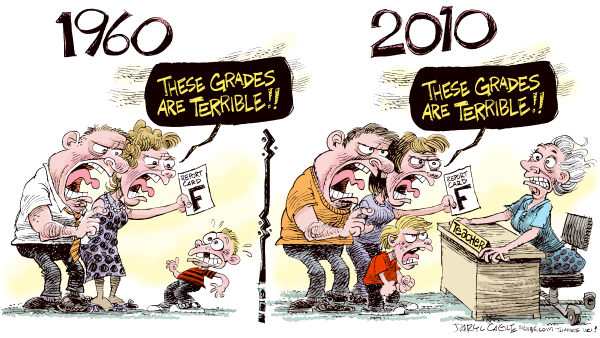 |
| 'The Flawed Culture of Education Today' https://artofeducation.wordpress.com/2012/05/23/the-flawed-culture-of-education-today/ |
(This post from David Didau delves into the issue, pointing out the 'versus' mentality that seems to have arisen: if it's not teachers against the government, it's teachers against parents or teachers against students or...)
I am about to start working in a school where students will be asked to fill out a survey to assess their teachers. Not knowing what this survey will entail, I'm curious (and possibly a bit apprehensive) about how the resulting data will be used.
I've experienced student surveys in the past where the instructions clearly asked respondents to avoid naming particular teachers (and when they did, names were removed) They were used as a general gauge as to how positive students felt toward their learning experiences in general, including - of course - time with teachers in lessons. However, the data was shared with everyone involved as it came in, rather than held by SLT and shared in a 'tidied up' version. This meant we were free to interrogate the results ourselves and where things weren't great, we individually reflected on why this might be with colleague discussion on how to address it. When all the responses were in, then there was a whole school meeting with SLT's interpretation but the tone indicated this was a set of results 'we' (SLT and all staff) were responsible for rather than just 'you' (the teachers). There was the acknowledgement that we are not lone islands with complete control over everything experienced in our lessons and a student's response might have been different on a different day, but where we saw strengths we could ask how that might be, and the same for where we saw targets. Out of this came approaches we could likely say were working, alongside things that definitely weren't. For example, in their comments, students made it clear they appreciated one-on-one time as teachers circulated the class during quiet working periods as - even in the most collegial of classes - they didn't always want to put up their hand and ask for assistance. It also became clear they didn't appreciate hours of homework and felt it had minimum impact on their learning, although they did feel that homework menus or customised homework helped them greatly. They also mentioned they didn't enjoy weekly reflections but admitted they did help them identify their achievements and targets, and so asked for them to be continued but perhaps done at key points, such as the end of a unit or topic, rather than at the end of every week. All these findings were directly applicable to each and every teacher whether they were practising the mentioned approaches or not - there was something we could all learn and consider.
On the other hand, I've also heard of student surveys where the results are used to berate and personally criticise rather than support and grow. I've even heard of them being used as a way of ranking teachers, a disgusting practice: we are not on Teacher Idol!
As everything points to the fact I am moving into a professional and collegial working environment, I fully expect that however these upcoming surveys are introduced and used, it will be without threat to individual teachers' confidence and self-esteem, so I hope to learn more about how this kind of feedback can be a positive aspect of self-monitoring.
I already carry out more and less informal surveys about my own teaching among my classes and use this to continually adapt to their needs, so this added layer might just add some extra insights.

No comments:
Post a Comment